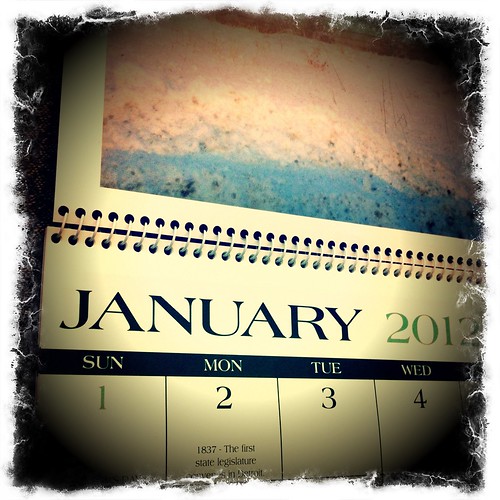Adding dates and date-specific events to your book will make it feel more like reality, but it will also put a pretty clear expiration date on its relevancy. At some point, every contemporary book ever written stops being relevant and starts being history. There are all sorts of little things you might be adding that are dating your book. What should you do about it?
Please Sell By...
Sometimes, there's just no other way to get certain plot points across, and an exact date is necessary. If there's some question of a character's age or birth place, or if someone goes to look at a grave, exact dates are going to come up. Sometimes, an exact date suits the circumstance. A character appearing in court before a judge, for example, may hear a long litany of charges and a docket number and specific dates. If the police are asking questions about a crime, they're going to use exact dates.
For some writers, it's just unavoidable. But even if you're terribly clever and you find a way to write around it, you're still dating your book. It doesn't take a specific date to clearly place your book in a specific time frame, and you may not even know it's happening.
Reference music, television or technology, and you're very clearly pinpointing a specific range of years, months or even weeks. Reference any sort of current event (like names of actual Presidents or earthquakes), and you're likewise pinning yourself down to a specific date or date range. Even clothing trends can date your book, or popular expressions. I recently read a book that extensively detailed activities on Facebook. Fifty years from now, that reference may be obscure and obsolete. So no matter how careful you are to avoid dates, you're dating your book anyway.
Even if you avoid pop culture and technology, it's happening. If you're writing with a contemporary, current voice, your book is dated. Once upon a time, Pride and Prejudice was a contemporary book. The author, Jane Austen, wrote about what life was like in the times she was actually living. And when it first came out, that book resonated with all who read it. Today, the language feels stodgy and archaic, and the descriptions of daily life aren't much like the way we live today. Speech and words are ever-changing. Words we use now are going to be outdated 100 years from now.
So now you know the cold, hard truth: your book is going to be dated, no matter what you do. One day, your contemporary setting will become historical. Here's the good news: it doesn't really matter.
Expired
Some authors are absolutely terrified of using dates, pop culture references and other material that might date their work...and it's silly. A word could be invented next year that catches on and becomes the word, and the book you wrote 6 months before will start looking old-fashioned all of a sudden. There's just no help for it: time marches on, and new books become old books. Don't be afraid of it, because it's no big deal.
You can prove it by Pride and Prejudice, and hundreds of other books. Jane Austen's classic was first published in 1813. It's sold more than 20 million copies, and you'll have no trouble buying it anywhere today. The book is constantly being referenced, adapted, re-written and discussed, for all its dated language and prim ideas and highfalutin morality. People still love that book, because it's good. It was good 200 years ago and it's still good today, even if it does describe history that's long gone.
Your book is going to be dated the moment you publish it -- the date's right there next to it, or underneath it, and it ought to be on your copyright page, too. So don't worry about that. Focus on making the content exceptional, and it won't matter that the book is dated. It may still stay in style for hundreds of years to come.











Really intresting, never though much actually about date setting. Do you think it is important too in real fantasy/fiction, as it usually takes place in a different world than our own?
ReplyDeleteLots of fantasy books refer to past time periods in order to establish the history of the setting, but the nice thing about fantasy writing is that you can make up your own measures of time. Maybe your fantasy world has 6 seasons, and the Great War happened 40 seasons ago. In any case, times and dates are relevant to pretty much any story.
ReplyDeletehey that a really nice update on this... thanks for sharing the information.. ..
ReplyDeleteThis comment has been removed by a blog administrator.
ReplyDelete